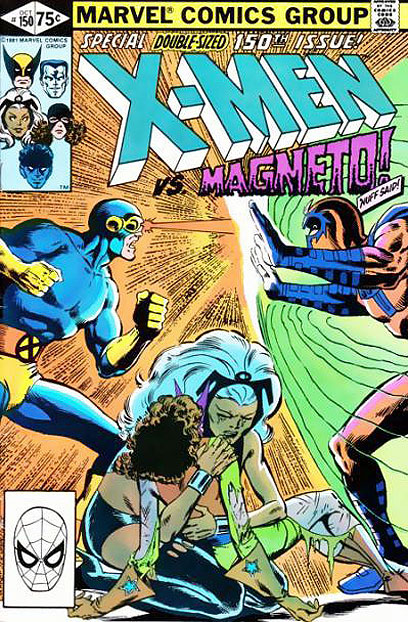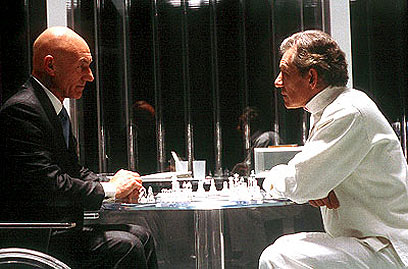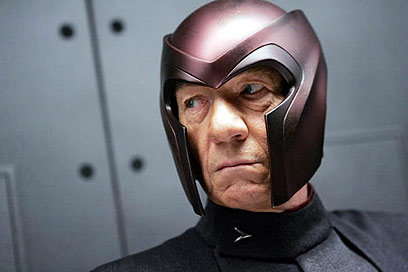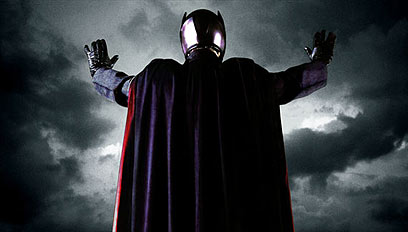
Where have Jewish villains gone?
(Video) If world loves to hate us so much, why don't superheroes fight Jewish nemesis? And how did Jewish background turn Magneto into a character one can identify with? Amir Bogen goes in serach of Jew Süss of superhero era
We've established a country, become independent, grown stronger and vowed "never again", and naively thought it would make a difference.
Israelis have become outcasts abroad. We're called murderers, racists, even occupiers. Is that they way we are perceived by the world? And if so, where the hell have cinema's Jewish villains gone?
Al Pacino as Shylock. Are we all Jews?
It seems that since Shakespeare's Shylock ("The Merchant of Venice") and Jew Süss (from Joseph Goebbels' propaganda film), the Hebrew antagonists have disappeared from popular culture, mainly that reflected on the big screen.
And if we Jews could somehow take pride in the character of the ultimate villain Magneto, in "X-Men: First Class" it's taken away from us too – the famous metallic wickedness of the head of the "Brotherhood of Mutants" in this series of films is shattered into thousands of pieces, along with the power of deterrence of the Hebrew genome.
In the new film, directed by Matthew Vaughn under the supervision of producer Bryan Singer (who directed the first two movies in the series), young Magneto (portrayed by Michael Fassbender) reaches a new low in his level of cruelty.
As the leading character, we follow him since his childhood as Max Eisenhardt of the Warsaw Ghetto, who is forcibly taken from his parents and turns in the 1960s into Erik Lehnsherr – a bold Nazi hunter, chasing the mad German scientist who kidnapped him (Kevin Bacon). At the end of the process he turns into Magneto, that evil arch-nemesis.
Kosher, but still stinks
As an animated character in the Marvel cartoon, Magneto was born in 1963 as a nemesis of the X-Men in the first issue created by Stan Lee and Jack Kirby (two Jewish American comic book artists), and as such he was the embodiment of pure evil.
But the past 30 years have seen a regression in his sources of evil, and he is considered less cruel, less strict, less of a man. The reason can be found in the first issue of "Uncanny X-Men", which was released in August 1981 and introduces Magneto for the first time as a Holocaust survivor. From here onwards, the downfall began.

"When he originally appeared in comics in 1963, Magneto simply represented a narcissist with power fantasies, and it's unlikely that Lee and Kirby intended for him to be a Holocaust survivor," says Christian Steinmetz, an expert in superhero culture from Georgia State University.
"Eventually he and Professor Xavier became a metaphor for the struggle within the
American civil rights movement, typified by Martin Luther King Jr. and Malcolm X. Magneto, in his crusade to protect the mutant race, was willing to kill humans. He represented racism himself when acting superior to humans."
The revelation of his Jewish roots in the early 1980s presented him, naturally, in a different light – less aggressive, less racist, much more complex, and even neurotic and traumatized.
"As the United States’ understanding of civil rights and human rights changed, so too did its representation of what 'evil' means. Magneto became a more complex and three-dimensional character when American culture shifted," says Steinmetz.

"In 1981, Magneto’s Jewish origin was revealed. Interestingly, in the same issue he defended himself against a nuclear submarine from the USSR, showing the issue's context with the US at the height of the Cold War. By that time, the 1972 Summer Olympics massacre and the 1978 Camp David Accords had happened," he adds.
"President Jimmy Carter had also fundamentally changed the way America approached human rights. Perhaps because of these events, Americans began to feel solidarity with Israel and a character like Magneto could transcend the civil rights metaphor. His acts were unacceptable until they were placed within a larger political context. Afterward he alternated between anti-hero and villain for 30 years."
The lone Jew
According to Dr. Jason Dittmer, the author of "Popular Culture, Geopolitics, and Identity", the reasons are slightly different and stem from the perception of the Jew's character in the American society.
"The release of 'X-Men: First Class' continues a trend from earlier 'X-Men' movies and the original comics in its distillation of multiple axes of social difference such as ethnicity, sexual orientation, and religion into a single axis of difference: Humans/mutants.
"As such, the X-Men serve as flexible symbols of otherness that allow for the questioning of liberal models of multiculturalism, inclusion, and identity in superhero narratives."


Magneto faces Professor X. Ideological battle in 'X-Men: First Class'
"Despite the collapse of all this social difference into one axis, the 'X-Men' has nevertheless spoken more directly to the Jewish experience than most other action/adventure melodramas in either film or comics. Also, Kitty Pryde, one of the few overtly Jewish superhero characters, is a team member.
"Many of the now-famous superheroes were created by Jewish Americans, but often this Jewishness was sublimated," says Dittmer, mentioning Superman as an example of a Jewish hero disguised as Clark Kent of America's Midwest.
Magneto, on the other hand, is an expression of pure strength apparent to all.
"He's a Holocaust survivor with a subsequent suspicion of humans' ability to embrace difference," says Dittmer. "Certainly having a Jewish nemesis is a rarity in American popular culture, at least since the Holocaust. But Magneto has, at least in recent decades, been an ambivalent nemesis."

This ambivalence is the secret of X-Men's charm, which unlike Captain America (whose story will hit the screens later this summer) and other patriotic superheroes, fought strangers who threatened the Americans' freedom from the outside – German Nazis, Soviet Russians, East Asians and even Islamic terrorists.
The Jews have been subtracted from this equation. Perhaps excluding "The Passion of the Christ", they are not presented as a threat. A result of political correctness (only Jews are allowed to present Jews as evil), an organic assimilation into the US population, or maybe the prejudice about the weak Jew.
"Unlike nemeses like the Red Skull (Captain America's Nazi foil) and the Joker (Batman's anarchic other), Magneto does not offer a radical opposite to the heroes of the story. Rather, he represents an alternative path that seems all too possible both in the past and present: A scenario in which ethnic identities take priority over civic ones and a multicultural society feeds on itself," rules Dittmer.
"Magneto's villainy, therefore, is qualified by his insider-ness. He is one of 'us' who chooses separation. Perhaps it is this insider-ness that makes him an acceptable Jewish villain."

But at least according to Dittmer, when it comes to Jews there is no discrimination between negative and positive heroes – and they are very rare in any case.
"The Holocaust re-scripted the role of Jews in American culture such that Jews became permanent victims, in need of rescue. It is this long-standing denial of the Jewish capacity for action that makes films like "Munich" (2005) and "Inglourious Basterds" (2009) so unique in Hollywood. Therefore, the lack of Jewish heroes and villains must be considered together, and the incredible power of Magneto should be linked to his insider status within American culture."
Magneto inglourious basterd. Fake trailer
According to Dr. Cord Scott of Harold Washington College in Chicago, the prejudice in the American society in the 1930s contributed to the way the characters were designed by their Jewish creators.
"Given the fact that these creators may have been subject to stereotypes of Jews from that time, and given the fact that they were often trying to project the 'American Ideal', the idea of creating a villain that would promote the very ideas that these Jewish creators were trying to avoid might have been too much to contemplate," says Scott.
"Besides, real villains like Hitler or criminal elements from the Depression made for far more compelling characters. Since the propaganda aspect of countries often worked into other visual media, connection to comics would be natural, but at the same time some visual stereotypes might be avoided."
It should be noted that the most popular Jewish villains in the US since the Holocaust were the gangsters of the amiable type of Bugsy Siegel and Meyer Lansky. They inspired the characters of Hyman Roth in "The Godfather Part II" and Max Bercovicz in "Once Upon a Time in America". They differ from Magneto in his wickedness and the level of threat he poses to humanity.
'Once Upon a Time in America.' Sergio Leone for and against Jews
Scott says that "X-Men: First Class" joins the "X-Men: Magneto Testament" edition, which explores Magneto's sources of evil.
"Even in this series, it wasn’t so much that Magneto was inherently evil, but was driven to evil by the abuse meted out to him by the Nazis," he explains.
And if so, his childhood trauma in the shadow of the Holocaust led him to this dead end of losing faith in humanity, which can explain his behavior and even make us identify with him – Americans and, even more so, Israelis.
Superheroes who made aliyah
And indeed, according to Scott, Israel is the Jewish people's hope in creating new villains for popular culture.
"The few instances of Jews as villains that I can think of would be in works like Joe Sacco’s 'Palestine' or 'Footnotes from Gaza'."
But the Israeli villains aren't driven from pure evil either. "Maybe in 'Yossel', but again those were examples of Jews reacting to situations in which they had to adapt," he explains.

New Jewish villain? 'Footnotes in Gaza'
The connection to Israel is apparent, according to Steinmetz, in the modern X-Men cartoons.
"Today, in the comics the character lives with the X-Men on 'Utopia', an isolated island where the mutant diaspora co-exists after they're almost brought to extinction," he says. "It’s easy to see this as an analogy for Israel, so the character has stabilized once again as complicated and multi-faceted, rather than simply villainous."
The up-to-date comics are joined by the "X-Men" films, which stress the Jewish origins of Lehnsherr/Magneto. "X-men: First Class" begins, like Singer's first "X-Men", with the traumatic scene from Magneto's childhood in Poland.
"Interestingly, the 'X-Men' films to date have kept Magneto's Jewish origin, where Nazis separate him from his parents. However, the movie version of Magneto remains 'evil' in that he is depicted as both racist and violent toward humans. As he says in the 'First Class' trailer, 'Peace was never an option.'"

"What is even more curious is that Hollywood doesn’t allow Magneto an accent that would signify his origin or ethnicity. Both Michael Fassbender and Ian McKellan portray him with a British cadence, despite the established origin. What does that say about how American cinema depicts Jewish villains?" he wonders.
So should we be proud of Magneto or ashamed of him? Does the revelation of his Jewishness add complexity and depth to his character or a stereotypical softness which humiliates his people? And should we settle for him, the weakened one, as the most threatening villain we have produced? Is this all we have to contribute to the superhero trend (which was formulated by us Jews)?
Well, these questions should not be directed at Marvel, or the Justice League of America, but rather at the Anti-Defamation League. This isn't a matter for X-Men to handle, but perhaps for Abe Foxman.
- Follow Ynetnews on Facebook










